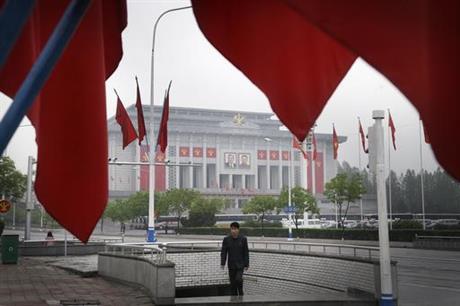
By ERIC TALMADGE
North Korea opened the first full congress of its ruling party since 1980 behind closed doors Friday, in an anticlimactic start to what officials have portrayed as a showcase of the country’s stability and unity under young leader Kim Jong Un despite tough new sanctions over its nuclear and missile programs.
North Korea’s information committee said the congress began Friday morning, and bused more than 100 foreign journalists to the venue for a look. But only from the outside. No one but presumably the thousands of delegates and officials were allowed inside the ornate April 25 House of Culture, draped in red party banners and flags.
Officials had another surprise as the day wore on for the news-hungry media guests — brought in to give the congress a global audience — who were then taken not to the meeting, but to a wire factory.
Despite the tight lid kept on the first day of the congress, the event is a major political milestone for Kim Jong Un, who was not yet born when the previous congress was held 36 years ago.
Sponsored Links
10 Ideas for Your Next Outdoor Adventure
VisitMo.com
7 Reasons You Should Stop Paying $300 For Glasses
Glasses USA
In preparation, Pyongyang, the capital, has been spruced up and large groups of students and workers could be seen around the city as a light rain fell Friday preparing for parades and rallies that are to be held in conjunction with the congress.
North Korea has held other big meetings of its ruling Workers’ Party since the 1980 congress — notably in 2010 and 2012 — but all six previous congresses came under national founder and “eternal president” Kim Il Sung, who died in 1994.
This one could provide a major opportunity for Kim, who is still largely a mystery to the outside world and has yet to travel abroad or meet any world leaders, to step out of the shadows of his grandfather, Kim Il Sung, and father, Kim Jong Il.
Kim Jong Un has patterned himself more closely after his charismatic grandfather than his notoriously reticent father, who almost never spoke in public. He spoke at length before a huge military parade last October and is widely expected to address the congress in some sort of public manner before it is over. Kim Il Sung spoke on the first day of the 1980 congress.
But, like so much else in North Korea, how the congress will play out still remains a mystery.
As of Friday evening, the government had not announced an itinerary, or even when it is to end.
The congress is the party’s highest-level decision-making body, though the real decisions are made by Kim and his inner circle. The delegates at the congress — there were about 3,000 in 1980 — will be there more to endorse than debate.
If the state media are any guide, the focus will be on praise of Kim and his successes on the nuclear front, along with improvements since he assumed power to boost the nation’s standard of living — themes the media hit hard as the congress approached and trumpeted again loudly on Friday.
The congress will also be colored by the anti-U.S. bravado that marks so much of North Korea’s worldview — that it is an underdog forced to pursue nuclear weapons in defense against the Goliath that is Washington.
“Now we are greeting the new era of Marshal Kim Jong Un,” said Pyongyang resident Choe Un Su, a 75-year-old retiree. “We should make the American soldiers get out of South Korea and under the leadership of our marshal we can open up the path of reunification.”
North Korea’s government has made clear it has no intention of backing down in its nuclear development program.
Hours before the start of the congress, the state-run Korean Central News Agency boasted of the country’s military achievements that followed its nuclear test and long-range rocket launch earlier this year, including claimed advancements in developing nuclear warheads, missile re-entry vehicles and long-range rocket engines.
It said the congress would be a historic celebration because Kim Jong Un’s guidance has elevated the country into a “nuclear, space power” and pushed it into the “absolute prime” of its efforts to build a “thriving nation.”
The gathering will likely provide some insights into what Kim’s other priorities are and who he wants to help him carry them out.
The economy is certainly high on Kim’s list, but his “byongjin” guns-and-butter policy of developing North Korea’s nuclear weapons while also building its domestic economy is seen by many outside economists as unlikely to succeed because of the heavy price the nuclear program brings in international sanctions that keep the country’s economy from growing.
Kim is expected to replace the party’s old guard with younger elites loyal to him and may formally elevate his younger sister, Kim Yo Jong, to a position that would essentially make her his second-in-command. Believed to be in her late twenties, she is currently a vice department director at the party’s Central Committee and frequently appears at her brother’s public events, standing out amid elderly male officials.



